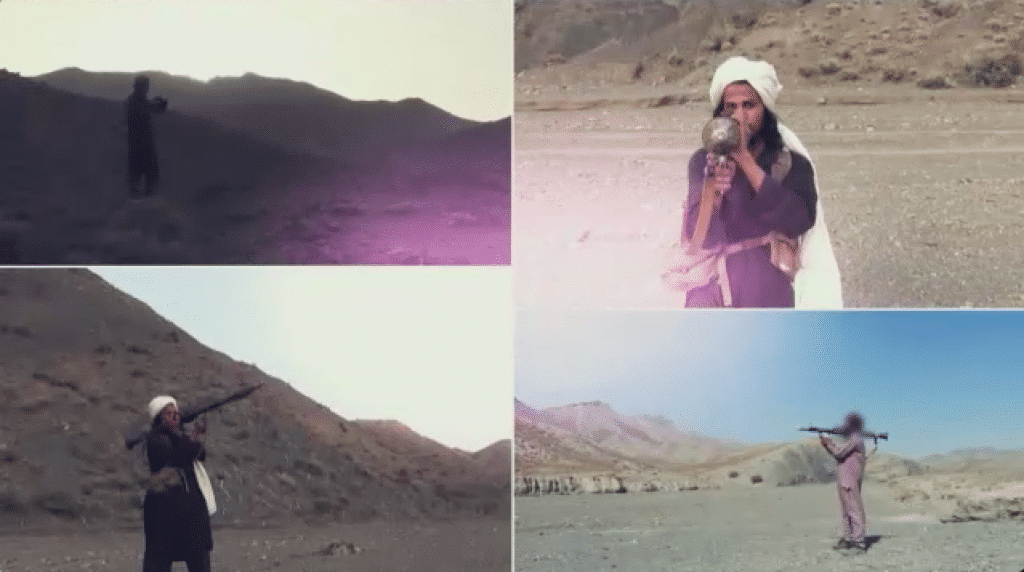September 23, 2019 | FDD's Long War Journal
Testimony: The Trump Administration’s Afghanistan Policy
September 23, 2019 | FDD's Long War Journal
Testimony: The Trump Administration’s Afghanistan Policy

Earlier this year, Al-Qaeda released a video emphasizing its unity with the Taliban. The production was entitled, “Under the Shade of the Islamic Emirate.”
Note: On Sept. 19, Thomas Joscelyn testified before the House Committee on Foreign Affairs at a hearing titled, “The Trump Administration’s Afghanistan Policy.” You can read his testimony, which mainly focuses on the relationship between the Taliban and al-Qaeda, here. An excerpt, without footnotes, is presented below.
Chairman Engel, Ranking Member McCaul, and other members of the committee, thank you for inviting me to testify today concerning the Trump administration’s Afghanistan policy.
Until recently, the administration’s approach has been centered on the effort to negotiate a deal with the Taliban. President Trump walked away from these talks earlier this month and it appears that they will not be resumed, but that may still be a possibility. My own view is that America’s policy with respect to Afghanistan should not hinge on what the Taliban’s political delegation says in Doha. The Taliban’s actions speak volumes. Even as the U.S. pursued an agreement, the Taliban attacked a non-governmental organization in Kabul, kidnapped and murdered a human rights worker, terrorized schools, released a video justifying the 9/11 hijackings, and dispatched its suicide bombers throughout the country, often killing civilians.
The negotiations also took place on the Taliban’s terms. The Taliban demanded that the government of Afghanistan be excluded from formal talks, and the U.S. acquiesced. Some Afghan officials were reportedly allowed to attend sessions in a personal capacity, but not as representatives of Afghanistan’s legitimate, internationally recognized government. The Taliban has repeatedly described the Afghan government as a “puppet” of the U.S. and therefore not a truly sovereign entity. The Trump administration’s unilateral negotiations with the Taliban bolstered this allegation. Meanwhile, the Taliban used the talks in Doha and Moscow to enhance its own standing. Thus, the administration’s approach to these talks undermined our ally while legitimizing the Taliban – that is, the Taliban’s Islamic Emirate of Afghanistan – as a political entity. It is difficult to see how this approach could possibly lead to peace.
Indeed, it appears the talks would have resulted in a withdrawal agreement, not a peace accord. Most of the details concerning the draft agreement between the Taliban and the U.S. remain hidden from the public. Therefore, I applaud this committee’s effort to perform oversight. But in my testimony today I would like to focus on one aspect of these negotiations that has been reported on in the press, albeit with some noteworthy discrepancies. Namely, my testimony is intended to serve as a rebuttal to the idea that the Taliban could act as a de facto counterterrorism partner.
Early on, Special Representative for Afghanistan Reconciliation Zalmay Khalilzad said he was satisfied with the Taliban’s counterterrorism assurances. On March 12, 2019, Khalilzad tweeted: “When the agreement in draft about a withdrawal timeline and effective counterterrorism measures is finalized, the Taliban and other #Afghans, including the government, will begin intra-Afghan negotiations on a political settlement and comprehensive ceasefire.” That is, the U.S. was willing to bargain a withdrawal timeline for the Taliban’s supposed counterterrorism guarantees before the Taliban had even met with the Afghan government. It is not even clear if the Afghan government would have been recognized as a formal entity in these “intra-Afghan negotiations,” and of course the mere prospect of further talks didn’t guarantee any real progress toward peace between the warring Afghan parties.
Moreover, there is no good reason, as far as I can tell, to think that the Taliban is trustworthy when it comes to restraining international terrorists. The Taliban has openly lied about the presence of al-Qaeda and foreign fighters on Afghan soil for years. They lied before 9/11. They lied after 9/11. It is difficult to imagine what verification measures could be put in place to ensure they are not lying now. This is especially true given that the administration may have been prepared to withdraw all American forces as part of the deal. The U.S. has a difficult time tracking al-Qaeda and the Islamic State with over 14,000 troops in country right now. That mission would only get more difficult with fewer, or zero, troops in Afghanistan. The so-called Haqqani Network was designated as a terrorist organization in 2012 in part because of its close ties to al-Qaeda. As I discuss more below, the Haqqani Network has now consolidated its influence within the Taliban. So a major component of the Taliban is an al-Qaeda allied, designated terrorist organization.
Four reports submitted to the United Nations Security Council since last year have documented the ongoing alliance between al-Qaeda and the Taliban. The monitoring team that authored these reports has stated: Al-Qaeda is “closely allied” with the Taliban, and the group’s “alliance with the Taliban and other terrorist groups in Afghanistan remains firm”; al-Qaeda’s relationship with the Taliban is “long-standing” and “strong”; al-Qaeda “has grown stronger operating under the Taliban umbrella across Afghanistan and is more active than in recent years”; the Taliban is the “primary partner for all foreign terrorist groups operating in Afghanistan, with the exception of” the Islamic State’s Khorasan branch; al-Qaeda “members continue to function routinely as military and religious instructors for the Taliban”; and al-Qaeda “considers Afghanistan a continuing safe haven for its leadership, relying on its long-standing and strong relationship with the Taliban leadership.”
Thomas Joscelyn is a Senior Fellow at the Foundation for Defense of Democracies and the Senior Editor for FDD’s Long War Journal. Note: For more on the close relationship between the Taliban and al-Qaeda, read the rest of Thomas Joscelyn’s testimony here.